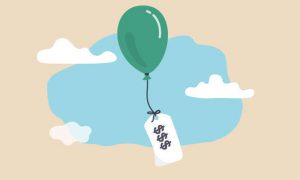Even if the pandemic and attendant quarantine measures begin to relax, businesses must nevertheless prepare for the possibility of continued and significant inflation.
Inflation has a lot of consequences on the economy. First and foremost, as the cost of retail products and services rises, it erodes purchasing power. It can also raise borrowing costs when interest rates rise. Inflationary pressures can feed on themselves, generating a feedback loop. Because people are spending more quickly, the supply of money exceeds demand, causing the currency’s buying power to collapse even quicker.
However, not all of inflation’s effects are negative. Inflation encourages people to spend. When faced with the threat of falling purchasing power, most people opt to buy now rather than wait. Because cash is likely to lose value, it’s best to complete your shopping now and stock up on products that won’t lose value. As a result, people are more inclined to stock up on groceries, fill up their gas tanks and stock up on new apparel for their growing children.
Now that we have a brief understanding of the impact of inflation on the overall economy, we can explore how an increase in inflation can impact companies specifically. Unfortunately, inflation has a bad impact on businesses, but a good understanding of the risks can help you to make the right adjustments and make a plan for unpredictable times.
The Risks of inflation to your company
As most business owners are aware, inflation represents an increase in the price of goods or services. While consumers may be aware of an increase in food and other goods, for companies, there can be numerous price increases that impact production.
Increasing Prices
When you produce items, the increase in prices is likely to affect your company. You will have to plan for increased raw material costs, and increased supplier prices. To put this into perspective, you need to think about what your company needs to buy in to produce a saleable item. For many companies, this will be a very long list, and if the price of each component increases in price by 5%, it will have a detrimental impact on your bottom line.
Even companies that offer services are not immune to this effect of inflation. While you may not need to think about the increasing prices of raw materials, you may need to consider the cost of increased utilities, raised rents and other fixed costs that are essential to continue trading. While you may be able to shoulder these costs by increasing your prices, if this is not possible, your profit margins will be reduced.
Wage Bills
An increase in inflation can also impact wages. When labor wages can’t keep up with increase in retail prices, there is a decrease in purchasing power. Workers are likely to demand wage increases, which can lead to increased labor costs. Or, if you are unable to pay higher wages, it could lead to staff attrition, increased sick days or, in a worst-case scenario, an increase in pilfering. If you are unable to hold on to your existing workforce, you will incur the cost of recruitin, and training new employees.
Another aspect of this risk is employee productivity. When your employees are faced with rising consumer costs, if you cannot increase wages, they are likely to feel a drop in motivation, which can decrease productivity. So, while you may keep your wage bills the same, you may find that you are producing less product, which will reduce your income and expenditure balance.
Borrowing
Borrowing can also be a consequence of inflation to companies. Many lenders are aware of the increased risk in the market and therefore increase rates. The Federal Reserve relies on a relationship between interest rates and inflation. While a low interest rate encourages companies to spend more, make business improvements or expand operations, when the rates increase, you may struggle to obtain finance or find it is cost prohibitive.
This may mean that your business needs to consolidate existing finances to continue trading at the same level or scale down future expansion plans. However, if you can obtain finance, the overall cost will decrease if you secure a fixed rate.
For example, if you borrow $5,000 at an annual interest rate of 5%, and inflation rises to 10%, the value of your debt in real terms is decreasing faster than the combination of interest and principal that you’re paying. So, it may be possible to expand your company if you have sufficient creditworthiness to secure a decent rate.
Currency Fluctuations
Another area of concern for companies due to inflation is currency fluctuations. High inflation is typically associated with a poor exchange rate. If your company relies on importing goods or raw materials, you are likely to pay more. Additionally, if you typically source raw materials domestically and export your items, you will not only be paying more for your raw materials, but the dollar is worth less in relation to the other currency.
You may also experience changes in your costs if you import raw materials from overseas. Since the exchange rate is poor, you will be paying more in dollars for the same amount in another currency, so you’ll need to account for the increase in your cost analysis.
We’ve already see some companies hedge their assets by buying tangible assets such Gold or investing in Crypto. However, investing in gold and Bitcoin can be risky, especially in a challenging financial environment dominated by inflation.
Companies have had a tough time over the last two years. With the Covid pandemic and control measures, many companies needed to accommodate working from home, reduced operating hours or even shutting down altogether.
Unfortunately, just as businesses are starting to see some recovery, they may be faced with the possibility of increased inflation. However, it is far better to be prepared. By assessing how inflation could impact your company, you can start to look at where you can make changes to address the possible inflation implications.
The post Inflation Is a Risk for Your Business, But Doesn’t Have to Spell Doom appeared first on Entrepreneur
Original source: Entrepreneur






